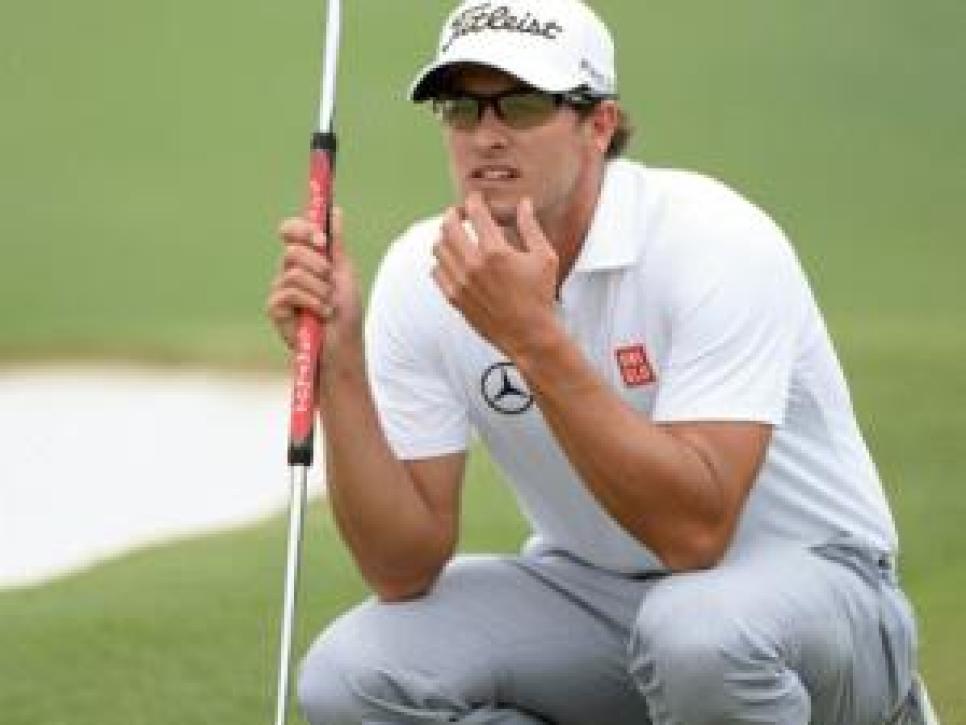The Loop
Anchoring update: Adam Scott lawyers up
While it's been reported that both Tim Clark and Carl Pettersson have retained Boston-based attorney Harry L. Manion III to represent their interests in their potential response to Tuesday's decision by golf's ruling bodies to ban anchored strokes, Manion told GolfDigest.com this afternoon that he now has been authorized by Masters champion Adam Scott to speak on his behalf on the issue, too.

"I'm just going to keep doing what I'm doing and deal with it then," he said. "I don't think there will be anything much for me to change. If I have to separate the putter a millimeter from my chest, then I'll do that. ... My hand will be slightly off my chest, probably."
Manion, a founding partner in the Boston law firm of Cooley Manion Jones and a former adjunct professor of law at Boston College Law School, says he represents nine players in this matter. Clark, Pettersson and Scott all use a long putter in an anchored method that would be banned under the stipulations of the new rule, known as Rule 14-1b, which is scheduled to go into effect in January 2016.
Mannion said there are no imminent plans to initiate legal action. Rather, he and the players are waiting to see how the PGA Tour responds to the decision. The tour announced on Tuesday that it would "now begin our process to ascertain whether the various provisions of Rule 14-1b will be implemented in our competitions and, if so, examine the process for implementation." It is expected that the issue will be discussed at a Players Advisory Council meeting next week at the Memorial Tournament, and that a final decision will be made by the PGA Tour sometime this summer.
"There's no rational basis for this ruling," Manion said, specifically indicating that players like Clark and Pettersson have putted for much of their lives this way without fear of it being against the rules. He said he has read the ruling bodies 40-page document explaining the reasoning for the decision to ban anchoring. "I'm not persuaded by it. There's some good lawyering in there, but I don't think they've made the case, and I believe the court would see it that way, too."
Matthew Mitten is a professor of sports law at Marquette University, director of the National Sports Law Institute and the author of Sports Law in the United States. He says the case history sides heavily with sports organizations making their own rules so challenging the anchoring rule might be problematic.
"It would be a difficult legal challenge for them to win," he said. "Historically, courts have been very deferential to sports governing bodies to regulate what they determine to be the rules of the game and to regulate playing equipment. There's a recognition that sports are unique and you've got to have uniform rules and that there needs to be an independent governing body that has to take the necessary steps to preserve the integrity of the game and its competitive balance. As long as they have independently exercised its judgment in prohibiting anchoring and they have a rational basis for coming to that conclusion, courts generally are not going to intervene. They're certainly not going to substitute their judgment for that of the sport's governing body."
Mitten said a governing body can run into difficulty if a playing rule would violate an individual's protected civil liberties. He specifically referenced the Casey Martin case, where Martin won the right to use a golf cart in PGA Tour events under provisions of the Americans with Disabilities Act.
Manion believes strongly that Finchem made his and the players' position clear back in February. At that time, Finchem publicly questioned the need for the rule, saying, "Essentially where the PGA Tour came down was that they did not think that banning anchoring was in the best interest of golf or the PGA Tour."
"I am optimistic that the tour will not follow this rule," Manion said today.
Manion believes nothing has changed since then and he believes many players who don't anchor support Clark's position. He also believes that while case law is widely in favor of the court system not getting involved in how sports organizations make their own rules, he thinks there are examples that work the other way, too.
"I think the Bob Gilder case against the PGA Tour is the leading case here, that you cannot do something arbitrary and capricious," Manion said, referring to the Ping square grooves lawsuit that was settled out of court in 1993, although largely believed to be a loss for the PGA Tour.
"Nobody wants to litigate," Manion said. "So you hope for the best."
In Tuesday's announcement, USGA President Glen Nager was asked specifically about the potential for a legal challenge to the decision.
"Let me start by saying that we're going to do whatever we have to do for the good of the game because that's our mission," said Nager, who has argued 13 cases before the U.S. Supreme Court. "Our mission is not to avoid legal challenges. Our mission is to determine the appropriate Rules for the game that make the game strong for the longâ¿¿term. "We believe that that's what golfers want, that's what golf organizations want, and we believe that the incredible passion that was demonstrated in the comment period shows how passionate people are about the game, that they don't want to tear the game apart. The people don't want litigation, they wanted to be heard and we heard them.
"In the event that any litigation is brought, we'll respond to whatever the claims are, but I can assure you this, as you mentioned a reference to [USGA General Counsel] Mark [Newell]'s professional training and experience and my professional training and experience, we have looked at this from the legal perspective, as well, as we feel confident of our position."